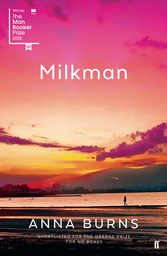
A brilliant invocation of life for an attractive 18 year old girl in Northern Island during the troubles.
In a narrow minded, sectarian, rumour driven community, in which people are mostly cowed by the irrational brutality of "renouncers", "defenders" and the state (but occasionally capable of astonishing bravery), Middle Sister tries to keep her head down and to stay out of politics but never-the-less is harassed by her neighbours, the renouncers, the state and her ma.
Stalked by a senior renouncer, who is able to threaten everyone around her with impunity, Middle Sister, is almost equal to the task of rejecting him until she discovers her "maybe boyfriend" is in an active homosexual relationship with his delusional tenant. Then middle sister finally gives in to "whats the point" and gets into Milkman's van. After driving her home and making it clear he expects to completely control her from then on, Milkman, after 5 attempts in which the wrong person, including the real milkman, was killed or maimed is assassinated by the British Army.
The story encompasses many murders; political, private and psychotic, fatal accidents and punishment beatings by both paramilitaries and the community (including women in a Ladies toilet outraged at male intrusion). Victims become victims, for crimes against convention both real and imagined but there is little build up and no tension generated in the narrative. There is a sense toward the end indeed that nothing has happened, which I think rams home the point that this then, in that place, was normal. This was everyday life, both for the community and Middle Sister.
Skimming the reviews of Milkman it is quickly apparent that it generated a great deal of tosh from the literati, from Dwight Garner in the New York Times who wrote that it was " ...interminable" and that he "would not recommend it to anyone I liked." to A. N. Devers in the Los Angeles Times who bizarrely believes that criticism of the book's style is "gendered" and that “Milkman’s critical reception is a little too much like subliminally delivered advice women receive throughout life to dumb themselves down to be better liked by the masses. Men and 'difficult' books by men don’t receive this criticism." Where has he been I wonder or perhaps he is only speaking for himself.
The style of authorship is, to best of my knowledge, unique and at times, difficult but not I think excessively so. Many I'm sure will be put off and quite legitimately so but the genius of the work is, that for those who like me "enjoyed" the book, that once finished it is hard, if not impossible, to think of it being written any other way.

